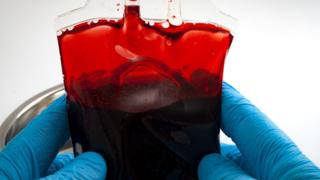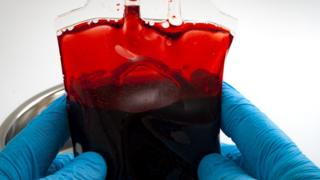NHS campaign for male blood sparks controversy
Many gay and bisexual men have hit out at an NHS campaign asking for more male blood donations. …

 Image copyright Getty Images
Image copyright Getty Images The NHS has revealed it is desperate for more male blood donations but the campaign has led some men to speak out about the difficulties they have experienced trying to donate.
Only 41% of new blood donors in England last year were men.
Certain factors mean only male blood is used in some specialist transfusions, such as with newborn babies.
Prospective male donors are now urging the NHS to make it easier to donate.
There are hopes for a 26% rise in first-time male donations in a bid to offset the current gender imbalance and end the possibility of a crisis in the future.
However, some gay and bisexual men have voiced their frustration over not being able to lend their support to the cause.
‘Let down’
Prior to 2011, men who have sex with men (MSM) were not able to donate blood.
This then changed, in 2017, when rules were relaxed in England, Scotland and Wales to allow them to give blood after abstaining from sexual activity for three months.
Jamie Lambert, 29, from London, says many gay and bisexual men people feel let down by the law.
“As a gay man, I have felt trapped between wanting to donate blood but having to lie about my sexual history to do so,” he says.
“It is so frustrating to think that I cannot give blood when there’s no good reason why I should not besides an age old trope that it is somehow more dangerous because of my sexuality.”
Ethan Spibey, founder of campaign group FreedomToDonate, told BBC News it was time for the government to lift the rules surrounding MSM donations, especially in light of the advances made in HIV detection processes used on donated blood.
“Thousands of potential safe donors are being excluded under the current blood donation policy,” he said.
“We have been campaigning to assess individuals based on their risk, not on their sexuality.”
The current deferral period is applied to donors who the Department of Health and Social Care (DHSC) consider to be at a higher risk of carrying a blood borne virus.
However, a spokeswoman for the DHSC told BBC News options that could allow more people to donate were currently being reviewed.
“We want as many people as possible to donate blood while minimising the risk of transmitting infections and are working closely with NHSBT [NHS Blood and Transplant] to explore options for a more individualised risk approach to donor deferral,” she said.
Of the 4,453 people diagnosed with HIV in the UK in 2018, 51% indentified as gay or bisexual men, according to Terrance Higgins Trust.
New diagnoses among this group have steadily decreased since 2005, most notably in London, where rates have dropped by 39% since 2015.
Why is male blood so important?
- The high level of iron present in male blood makes it especially helpful to patients who rely on regular life-saving transfusions
- Unlike men, women produce antibodies during pregnancy, which makes their blood unviable for numerous specialist transfusions and blood-based products, such as complete blood transfusions in newborn babies
‘Closures’
Rowan Swainson, 66, from Wellington, has given blood more than 40 times.
But he told BBC News recent closures in Shropshire had led to a rising cost in travel to blood centres, which was deterring many donors.
“In cutting costs to the service, they have just passed on the costs to their most valuable asset, which is their volunteer donors,” he said.
“I know many donors that have stopped donating because of this.
“There are other blood products that I could donate but that would involve a train journey and a full day’s duration – something many of us simply can’t afford to do.”
An NHSBT spokesman said: “We have closed some sessions over the last few years because the long-term trend is for hospitals to use slightly less blood each year.
“We appreciate that has meant some people, especially in rural areas, are not able to easily travel to a session.
“This campaign appeal is about asking for new male donors, mainly at our 23 permanent blood donor centres in towns and cities.”
Regular donor Rick Jeanes has been giving blood for decades but in recent years, he said, he had experienced longer waiting times.
“I wish that I could get a regular appointment,” he told BBC News.
“How can the NHS get enough blood when the teams have been devastated across the region?”
“There needs to be more nurses, because people will not attend again if they are rejected when they first attend.”
The NHSBT spokesman said: “If all the sessions close to you are full, that’s a good sign that we are getting all the donors we need in that area at that time.
“Your blood will still save lives if you want in a few weeks or months instead.”
A full list on who’s eligible to give blood can be found here.

